Invitado especialísimo en este espacio ”Vis a vis”.
Se crió correteando entre ensayos y escenarios. Esperaba los descansos para agarrar un micrófono y jugar. Reía mucho de chico y creaba chistes. Siempre le atrajo el dibujo. En la enseñanza media ganaba premios.
Cuando se graduó de Artes Visuales con Mención en grabado en la Universidad de Chile, se dedicó a ilustrar. Y de ahí pasó a la caricatura. Fue fácil porque sus ilustraciones eran (y son) muy graciosas.
Fundamos el dúo “Pelayos” para crear libro-álbum muy humorísticos, para primeros lectores y también para crear humor gráfico.
Hicimos 17 caricaturas, 12 las enviamos a concursos y obtuvimos 7 premios internacionales. Ha sido Jurado en Concursos Internacionales.
Estando en plena “producción”, toma la decisión de dedicarse solo a sus ilustraciones, porque tenía mucho trabajo. Pero no me deja abandonado y me enseña a usar Photoshop.
Creamos el sitio humorsapiens.com y es coeditor conmigo. Nos entregamos mucho tiempo al estudio de la teoría del humor.
También creó junto a mí el Concurso de Humor Gráfico (uno nacional y uno internacional), “Humor Sapiens, 2024”.
Escribe libros infantiles (sin mí) y compone canciones para niños y para adultos.
Se llama Alex y es mi hijo menor.
(Esta entrevista fue realizada en 2014, antes de irse a residir a España).
PP: No sé si te gustó cómo te presenté, pero ya es tarde para rectificar. Disculpa. Dime la verdad, ¿te gusta que te hagan entrevistas?
ALEX: Sí, sobre todo cuando me la hago yo mismo.
PP: Bueno, casi es así en este caso. Comencemos… En este año 2014, ¿cómo ves el estado actual del humor aquí en Chile, en televisión, radio, teatro, literatura y gráfica?
ALEX: El humor gráfico en Chile ha mejorado considerablemente, alejándose del tradicional "costumbrismo". Sin embargo está más presente en el ciberespacio que en los medios de prensa. El humor televisivo sigue, a mi juicio, siendo pobre. En los otros lenguajes prefiero no opinar porque desconozco su estado.
PP: Pues te lo digo yo: poquísimo humor literario, en teatro impera la comedia costumbrista (maridos infieles, etc,), el cine que se hace es muy dramático, trágico. Y en restaurantes y bares, los cuentachistes. En fin, sigamos… Continuaré con el cuestionario fijo que le estoy haciendo a todos los colegas… En varios países de América Latina se dice: "Mi país es un pueblo de humoristas", "en mi país, tú mueves una piedra y sale un humoristas", etc. ¿En Chile se dice lo mismo?
ALEX: Sí y es chovinismo del bueno. Sin embargo, conjeturando, me da la impresión que en los países de cultura latina (no confundir con latinoamericana) hay cierta tendencia a reír y a hacer reír.
PP: ¿Hablas de España, Portugal, Italia? ¿O lenguas romances en general? ¿Por qué es distinto a la Latinoamericana? Bueno eso me lo respondes hoy o mañana, cuando nos veamos. Aquí contéstame esto: ¿Es cierta la acuñada frase: "Es más fácil hacer llorar que hacer reír”?
ALEX: No estoy de acuerdo, en ambos géneros hay mucha dificultad. Hay quienes hacen reír y llorar usando recursos fáciles y cautivan a quienes ríen o lloran de lo fácil. En el caso contrario, aunque a un alto nivel, pasa lo mismo.
PP: En eso tienes razón, pero hay que tener en cuenta que un artista para crear, debe dominar el lenguaje de la modalidad artística que practica. Y ahí hace reír o llorar, ¿no es cierto? Sin embargo, en el caso de los que hacen humor, además del lenguaje artístico, debe manejar también el lenguaje humorístico. Y como no existe un lenguaje trágico, parece que es más difícil hacer reír. Pero sigamos anotando para debatir después. Bueno, dile a nuestros lectores, cuándo decidiste hacerte humorista.
ALEX: El humor ha estado siempre en mis creaciones. Si me refiero en concreto al humor gráfico, desde que el personaje que me está preguntando ahora, me convenció para formar "Pelayos".
PP: No me eches la culpa. Usted es humorista desde que nació. Por ejemplo, cuando no tenías ni tres años, te escuché marchar gritando consignas, pero bien en voz baja: “¡qué se vaya la escoria, que se vaya la escoria, que se vaya la luz!”. Asociaste lo que ocurría en las calles con esos actos vergonzosos de 1980, donde se iban para Miami los infelices por El Mariel y lo que les hacían y los apagones que sufríamos por otro lado. Eso no te lo enseñé yo. Dime una cosa, para ti, ¿el humorista nace o se hace?
ALEX: Yo creo que se hace, se va haciendo desde que nace, recibiendo estímulos y reaccionando ante ellos. Sí creo que una persona puede nacer con más sensibilidad y creatividad que otra, pero la diferencia es mínima, es más importante el entorno y su adaptación. En ambos casos el éxito depende del esfuerzo.
PP: Claro, pero alguien puede tener tremenda vis cómica y si no se cultiva, no se supera, será un humorista también. Mediocre, eso sí… Esta pregunta también es parte del cuestionario: ¿Cuál ha sido el mejor y el peor momento de su carrera hasta el día de hoy?
ALEX: Como humorista gráfico tengo poca historia. Supongo que lo mejor es cuando me felicitan mis pares o gano un concurso. Lo peor es cuando no estoy inspirado o sufro una crisis vocacional donde quiero tirarlo todo por la borda.
PP: Siempre son más los momentos malos que los buenos, si se piensa así. Lo que sucede es que esos momentos negativos se convierten en satisfactorio una vez terminada la obra. Y bien, dime, una pregunta que sé la respuesta, obvio, como profesional del humor, ¿te ríes fácil? ¿Con qué tipo de chistes?
ALEX: Soy de sonrisa perenne y me río bastante, pero no con cualquier cosa. Me gusta el humor blanco y el negro tirando a gris claro. Las cosquillas no me hacen gracia.
PP: Lo reafirmo, es muy exigente en todo, preciosista, detallista e intransigente con el arte malo. Pero para darle otro aire a este vis a vis, ¿nos puedes contar alguna anécdota relacionada con su profesión de humorista?
ALEX: Recuerdo cuando aún estaba en el colegio participé en un concurso de humor gráfico, mi primer concurso. Aunque era más bien de historieta. El guión era de mi padre, cuando no estaba ni remotamente la idea de formar un dúo creativo. Camino al lugar de la entrega, cruzando Alameda, que es la principal avenida de Santiago de Chile y unas de las más anchas, me percaté de que se me había caído una de las páginas. Enseguida me doy cuenta de que estaba en la acera del frente, bajo el zapato de un distraído señor. Como el semáforo estaba en rojo no podíamos recogerlo y mi papá comenzó a gritarle al tipo a vivo pulmón: ¡Animaaaal! ¡Animaaaaaaal! (entre otras cosas más fuertes). Pero el hombre ni se enteraba. Finalmente dio la luz verde y corriendo recuperé el dibujo. Eso sí, con una huella de zapato que tuve que disimular con una goma de borrar. Fue mi primer premio.
PP: Me estás dejando públicamente como un energúmeno. Por eso debo aclarar que lo soy. No, sucede que todo lo que sea una daño, un sufrimiento para mis hijos, me nublo. En este caso, le grité decentemente, me miró y no me atendió. Ahí se me subió el tropical salvaje y le dije mil cosas. Pero está, no me arrepiento y más porque agarraste un premio. Lo hiciste, recuerdo, como un dibujante profesional. Y a propósito, ¿con cuáles colegas te identifica?
ALEX: Me identifico con el humor gráfico cubano, particularmente Boligán, Ares y Ajubel. Pero siento gran admiración por Quino, Steinberg, Chummy Chúmez, Adolf Born, Fernando Krahn, Calpurnio, Kosobukin, Schulz, entre muchos más.
PP: Muy buen gusto. Bien enseñado, el chico… Dime una cosa, ¿qué me aconsejas a mí como humorista?
ALEX: No soy de dar consejos, pero supongo que esta recomendación valga para todos los casos: cuidado con la autocomplacencia y la inercia.
PP: Buen consejo. Ahora te tengo que despedir, hasta dentro de unos segundos más. No, en serio, gracias por complacer a tu padre una vez más. Y aprovecho para confesar ante nuestros lectores que, muy honestamente, considero que eres mucho más artista que yo. Te quiero siempre.
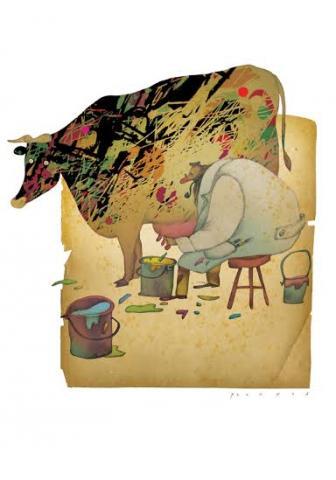
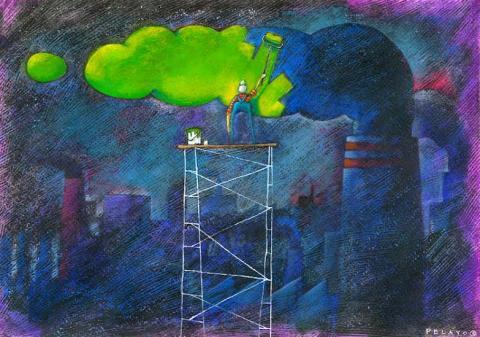
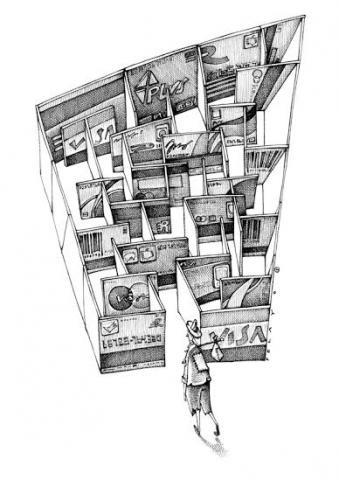
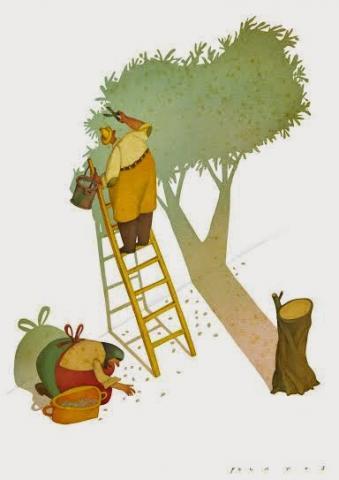
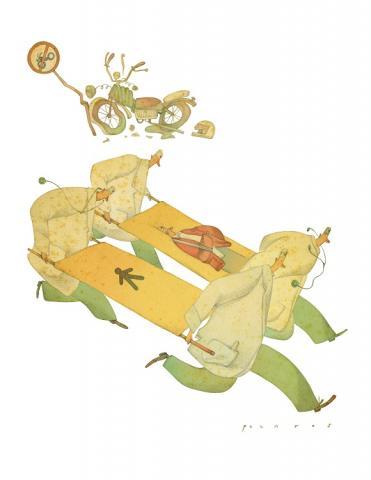
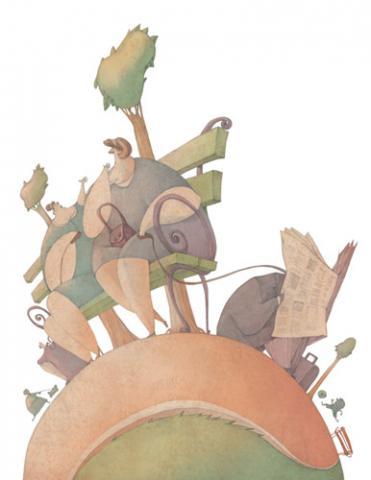
Interview with Alex Pelayo
By Pepe Pelayo
A Very Special Guest in this "Vis a Vis" Segment
He grew up running around rehearsals and stages. He would wait for breaks to grab a microphone and play. He laughed—a lot as a child—and created jokes. Drawing always attracted him. In middle school, he won awards.
When he graduated in Visual Arts with a specialization in printmaking from the University of Chile, he devoted himself to illustrating. From there, he moved on to caricature. It was an easy transition because his illustrations were very funny.
We formed the duo "Pelayos" to create highly humorous picture books for early readers and also to produce graphic humor.
We created 15 caricatures, submitted 12 to competitions, and won 7 international awards. He has served as a judge in international competitions.
While in full "production mode," he decided to focus solely on his illustrations because he had a lot of work. However, he didn’t abandon me; he taught me how to use Photoshop.
We created the website humorsapiens.com, where he is a co-editor with me. We have spent much time studying the theory of humor.
Together, we also launched the Graphic Humor Contest (one national and one international), "Humor Sapiens, 2024."
He writes children’s books (without me) and composes songs for both children and adults.
His name is Alex, and he is my youngest son.
(This interview was conducted in 2014, before he moved to Spain.)
PP: I don’t know if you liked how I introduced you, but it’s too late to change it. Sorry. Tell me the truth—do you enjoy being interviewed?
ALEX: Yes, especially when I’m the one interviewing myself.
PP: Well, that’s almost the case here. Let’s begin… In 2014, how do you see the current state of humor here—in television, radio, theater, literature, and graphic arts?
ALEX: Graphic humor in Chile has improved significantly, moving away from traditional "costumbrismo" (folk humor). However, it’s more present in cyberspace than in the press. As for television humor, I still find it poor. Regarding the other mediums, I prefer not to comment because I’m unfamiliar with their current state.
PP: Well, I’ll tell you: there’s very little literary humor, theater is dominated by costumbrista comedy (unfaithful husbands, etc.), films are highly dramatic and tragic, and in restaurants and bars, it’s all joke-tellers. Anyway, let’s continue… I’ll proceed with the standard questionnaire I’m asking all our colleagues… In several Latin American countries, people say, “My country is a nation of humorists,” or “In my country, you move a stone, and a humorist appears.” Is that said in Chile too?
ALEX: Yes, and it’s good-natured chauvinism. However, I feel that in Latin culture countries (not to be confused with Latin American), there’s a certain tendency to laugh and to make others laugh.
PP: Are you talking about Spain, Portugal, Italy? Or Romance languages in general? Why is it different from Latin America? You can answer that today or tomorrow when we meet. For now, answer this: Is the phrase “It’s easier to make people cry than to make them laugh” true?
ALEX: I don’t agree. Both genres are equally challenging. Some people make others laugh or cry using easy tricks and captivate those who respond to the simple stuff. On the other hand, even at a high level, the same applies.
PP: That’s true, but we must consider that an artist must master the language of their artistic modality to create. And in doing so, they make others laugh or cry, right? However, in the case of humorists, besides mastering the artistic language, they must also manage the humor language. Since there’s no such thing as a "tragic language," it seems harder to make people laugh. Let’s keep noting this for later debate. Tell our readers, when did you decide to become a humorist?
ALEX: Humor has always been present in my creations. If I refer specifically to graphic humor, it was when the person asking me this convinced me to form "Pelayos."
PP: Don’t blame me. You’ve been a humorist since you were born. For example, when you weren’t even three years old, I heard you marching and softly chanting slogans: “Out with the scum, out with the scum, out with the lights!” You associated what was happening on the streets with those disgraceful acts of the 1980s when people fled to Miami via El Mariel, and the blackouts we suffered. I didn’t teach you that. Tell me, in your opinion, are humorists born or made?
ALEX: I believe they’re made—shaped from birth by receiving stimuli and reacting to them. I do think some people are born with more sensitivity and creativity than others, but the difference is minimal. Environment and adaptation matter more. In both cases, success depends on effort.
PP: True, but someone could have great comic potential, and if they don’t cultivate it, they’ll still be a humorist—albeit a mediocre one. This question is also part of the questionnaire: What’s been the best and worst moment of your career so far?
ALEX: As a graphic humorist, my career is short. I suppose the best moments are when peers praise me or I win a competition. The worst is when I’m uninspired or face a vocational crisis where I want to give it all up.
PP: There are always more bad moments than good ones if you think like that. But those negative moments turn satisfying once the work is finished. Here’s a question I already know the answer to: As a professional humorist, do you laugh easily? What kind of jokes make you laugh?
ALEX: I have a perpetual smile and laugh quite a bit, but not at just anything. I like clean humor and black humor leaning toward light gray. Tickling doesn’t amuse me.
PP: I can vouch for that. You’re very demanding, meticulous, and uncompromising about bad art. But to lighten the tone of this vis-à-vis, can you share an anecdote related to your career as a humorist?
ALEX: I remember participating in a graphic humor competition when I was still in school—my first competition, though it was more about comics. The script was by my father, long before we even considered forming a creative duo. On the way to submit it, while crossing Alameda—the main avenue in Santiago, Chile, and one of the widest—I realized I’d dropped one of the pages. It was on the opposite sidewalk, under the shoe of an oblivious gentleman. Since the light was red, we couldn’t retrieve it, and my dad began shouting at the man at the top of his lungs: “You animal! You aaaaaanimal!” (among other, stronger things). But the man didn’t even notice. Finally, the light turned green, and I ran to recover the drawing, which now had a footprint that I had to erase with a rubber eraser. It won my first award.
PP: You’re making me look like a madman. Let me clarify: I am one. No, the thing is, when something causes my children harm or suffering, I lose it. In this case, I yelled decently, but when he ignored me, the tropical savage in me emerged, and I said a thousand things. No regrets—especially since you won an award. You did it like a professional artist. Speaking of which, which colleagues do you identify with?
ALEX: I identify with Cuban graphic humor, particularly Boligán, Ares, and Ajubel. I greatly admire Quino, Steinberg, Chummy Chúmez, Adolf Born, Fernando Krahn, Calpurnio, Kosobukin, Schulz, among many others.
PP: Excellent taste—well-taught, kid. One last thing: What advice would you give me as a humorist?
ALEX: I’m not one to give advice, but I suppose this applies to all cases: beware of self-indulgence and inertia.
PP: Good advice. Now I must bid you farewell—for a few seconds, at least. No, seriously, thank you for indulging your father once again. And I’ll take this moment to confess to our readers that, very honestly, I consider you a far greater artist than me. I’ll always love you.
(This text has been translated into English by Google Translate)

